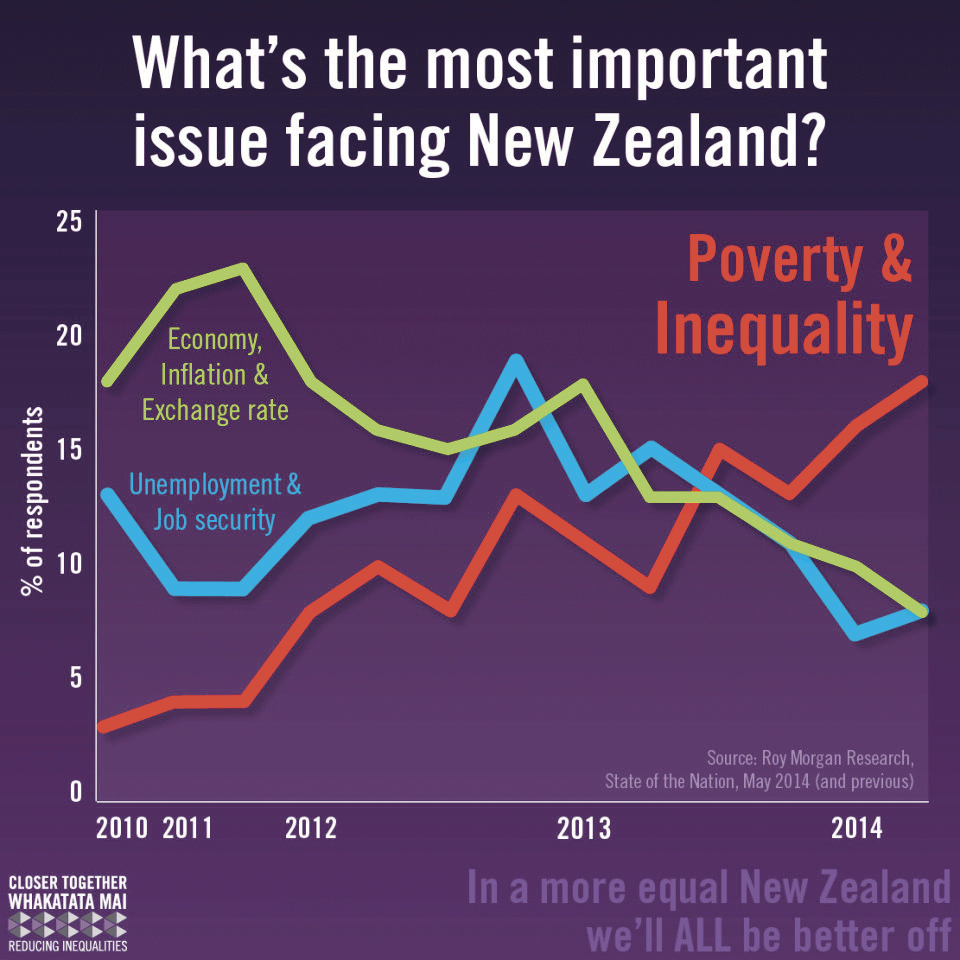 September 2014
September 2014
Feature
Chris Nichol
Archbishop John Dew has reminded us, ‘our children are our nation’s precious taonga. We, as adults, have a collective responsibility always to strive to do our best for our children’.
But we’re failing. A quarter of our one million children live below the poverty line. Many go to school hungry, or without decent shoes or raincoats, because their parents simply do not have enough money left at the end of each week.
Why are so many of our children in poverty? It is in part because wages are so low for many; in part because benefits needed are inadequate; in part because a few are earning too much. Inequality drives poverty and poverty drives inadequate housing, bad health, poor developmental and educational outcomes for children.
Some people would like to separate poverty from the issue of inequality, and argue only poverty matters.
For Christians this should be a surprise. Inequality is a New Testament headline. Mary, the mother of Jesus, spoke of filling the hungry with good things and sending the rich empty away (Luke 1:46). Jesus challenged people to sell their possessions and give to the poor (Luke 12:33). He saw inequality as an affront, a disgrace.
Income inequality is one of the main reasons we have poverty in this country. Excessively high incomes are inevitably linked to poverty. Salaries are low for so many people because over the last 30 years bargaining power has shifted strongly in favour of the wealthy, leading to stagnant wages for most workers and rapidly rising chief-executive pay.
New Zealand’s benefits rank between 31st and 33rd lowest among the 33 OECD countries. One reason is because we extract so little tax from our wealthiest citizens. Our top tax rate is amongst the lowest in the developed world. The incomes of the rich are being protected at the expense of the poor.
For the biblical writers this is an outrage. The whole point of an economy is to sustain community and protect the most vulnerable. Isaiah, Micah and Zechariah reserve some of their sharpest criticism for rulers who are not committed to ensuring everyone’s basic needs can be met. But increasingly our economy and society seem intent on securing the peace of the wealthy at the expense the most vulnerable. Why have we been so willing to accept the fact a quarter of our children live in poverty?
Perhaps it is because of a flawed theology that suggests the rich deserve their wealth and the poor must be poor through their own bad choices. This misguided prosperity gospel flies in the face of the insight of Genesis that all people are created in the image of God and all should be able to enjoy the fruits of God’s creation.
As a country we seem to think we create our own wealth – or lack of it – and have little responsibility for others in the community; forgetting the ways society contributes to our lives, the benefits of our upbringing, to say nothing of our sheer luck.
This unchristian ideology has allowed benefits to be cut by up to a quarter of their 1991 value and never restored. Little will change to alleviate poverty until this ideology is displaced.
That shouldn’t be so difficult. We simply have to look at the many people who struggle with so little; working hard for their families against unenviable odds and the lot of their children. And we should also look at those who earn so much and ask whether their talents and contributions really do justify incomes tens or even hundreds of times higher than those at the other end of the scale.
The amount needed to lift affected New Zealanders out of poverty was estimated in 2007 to be no more than $1.8 billion. That’s less than a tenth of the wealth of the top ten on New Zealand’s rich list.
If we are willing to address the fact of great wealth we can seriously reduce hardship in New Zealand. Then, in a more equal New Zealand, all our children will have the chance to thrive.
Chris Nichol is a Presbyterian minister who specialises in media and communications. He is working with the New Zealand Council of Christian Social Services to raise awareness of the issue of income inequality and its effects, notably poverty and child poverty in particular.